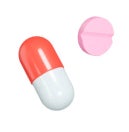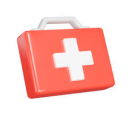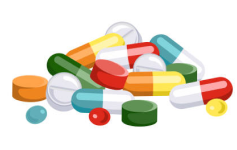Uses
What is Pemetrexed for?
Pemetrexed is a chemotherapy medication used to treat non-small cell lung cancer and malignant pleural mesothelioma (cancer of the lung lining). It works by blocking the action of folate, which stops the cancer cells from multiplying and they eventually die. It may be given on its own or in combination with other chemotherapy drugs.
How should I take or use Pemetrexed?
Pemetrexed is injected into the vein (given intravenously) as an infusion (drip).
Precaution
What precautions should I take when taking or using Pemetrexed?
-
Inform your healthcare professional if:
- You are allergic to this medication or any of the other ingredients of this medication.
-
You are pregnant, planning to become pregnant, or breastfeeding
- Female patients who may become pregnant should use effective birth control during treatment and for 6 months after their last treatment.
- Male patients with female partners who could become pregnant should use effective birth control during treatment and for 3 months after your last treatment.
- Do not breastfeed during treatment and for 1 week after your last dose.
- You are taking any other medications, including supplements, traditional medications and herbal remedies.
-
To lower the chances of getting side effects, you will be given the following medications:
-
Folic acid tablets:
- You need to start taking folic acid tablets at least 1 week before starting treatment.
- Continue taking it daily and for 3 weeks after your last treatment.
-
Vitamin B12 injection
- You need to receive one dose 1 week before starting treatment and then every 3 cycles thereafter (about every 7-9 weeks) while you are on treatment.
-
Dexamethasone tablets
- Take them as instructed and complete the course.
- This is given to prevent skin rashes from the treatment.
-
Folic acid tablets:
What food or medication should I avoid when I take or use Pemetrexed?
- Avoid taking non-steroidal inflammatory drugs (NSAIDs) such as ibuprofen 5 days before, on the day of treatment and for 2 days after treatment.
- Avoid taking traditional Chinese medications (TCM) or “jamu” when you are on this medication.
Side Effects
What are some common side effects of Pemetrexed?
-
Decreased white blood cells, red blood cells and platelets. This may put you at increased risk of infections, bleeding or bruising, and feeling tired.
-
To reduce your risk of infection:
- Practice good personal hygiene.
- Avoid eating raw or half-cooked food.
- Avoid crowded places and coming into close contact with people who are not feeling well. Wear a face mask when you’re going out.
-
To reduce your risk of bleeding:
- Be careful when using sharp objects such as knives.
- Brush your teeth with a soft-bristled toothbrush.
-
To reduce your risk of infection:
-
Diarrhea
- Drink more water or clear fluids to replace the fluids lost.
- Avoid oily, spicy food or dairy products.
-
Mouth ulcers
- Avoid eating hard or spicy foods.
- Brush teeth with a soft-bristled toothbrush.
- Use a non-alcohol-containing mouthwash to maintain mouth hygiene after meals.
-
Skin rashes
- Complete the course of dexamethasone tablets as instructed to prevent rashes.
- Use moisturizer regularly to prevent dry skin.
-
Mild nausea or vomiting
- Take small, frequent meals.
- Avoid food/smells that may make you feel nauseous such as oily, fried food or strong-smelling food.
What are some rare but serious side effects that I need to seek medical advice immediately?
- Symptoms of infection such as high fever of 38 ⁰C and above
- Unusual bleeding, bruising or black sticky stools
- Severe skin rashes affecting a large area of the body or causing pain and blistering
- Severe diarrhea (more than 4 times a day)
- Symptoms of lung inflammation such as a dry cough that doesn’t go away and feeling more breathless than usual
- Symptoms of kidney problems such as unusual decrease in urination and swelling of the lower legs
- Drug allergy. The symptoms of a drug allergy include one or more of the following:
- Swollen face/eyes/lips/tongue
- Difficulty in breathing
- Itchy skin rashes over your whole body
If you experience any of these symptoms, you should see your healthcare professional immediately.
Disclaimers
Please take note that the above is not a complete list of all possible side effects. If you have any concerns about your medication or if you have other side effects that you think are caused by this medication, please consult your doctor or pharmacist.
If you take more than the recommended dose, please seek medical advice immediately. The information provided on this page does not replace information from your healthcare professional. Please consult your healthcare professional for more information.
This article is jointly developed by members of the National Medication Information workgroup. The workgroup consists of cluster partners (National Healthcare Group, National University Health System and SingHealth), community pharmacies (Guardian, Unity and Watsons) and Pharmaceutical Society of Singapore. The content does not reflect drug availability and supply information in pharmacies and healthcare institutions. You are advised to check with the respective institutions for such information.
Last updated on Feb 2024

Need More Medicine?
Use Medicine Order Service on HealthBuddy.

Medicines Reminder
Get reminders and chart progress on HealthBuddy.



















